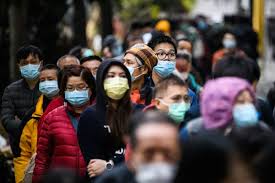With the outbreak of COVID-19, wearing facemasks has become a regular practice in the United States in an effort to help minimize the spread of the disease. Facemasks in China, however, were established as common practice long before COVID-19 emerged. In China, facemasks can be worn when air pollution is severe, or it is cold out, or simply for fashion. People who are sick wear them knowing it is common courtesy to protect others from becoming sick or to protect themselves if they are healthy. Facemasks have become a sociocultural norm, symbolizing protection and solidarity. But while facemasks may serve the Chinese as a protective barrier from airborne pathogens, they cannot shield against growing anti-Chinese sentiment.
Because Wuhan, China is the ground zero of the coronavirus pandemic, COVID-19 has been rechristened the “Chinese virus”, “Wuhan virus”, and “Kung flu” by numerous politicians and White House officials. This anti-Chinese rhetoric is becoming increasingly more prevalent as coronavirus cases skyrocket and frustration grows. Blaming the Chinese for being responsible for the COVID-19 outbreak has led to questionable speculation about the origins of the virus coming from bat soup to outright absurd conspiracy theories claiming the virus was developed as a bioweapon in Wuhan’s biolab. What is real, however, is the escalating racism and violence towards Asians around the world.
In the United States, anti-Chinese sentiment expressed by politicians effectively makes its way to the public through various social media platforms. “Wuhan virus” is retweeted thousands of times as Facebook posts carry racist hashtags with distorted news aimed at furthering political narratives while racist comments about Chinese culture criticize food and hygiene. Chinese customers are being rejected service by restaurants and facing travel restrictions. Reports of verbal altercations and physical attacks against Asians have occurred throughout the United States, Europe, and Asia. Facemask or not, the Chinese have been stigmatized by the xenophobic, ill-informed assumptions that every Chinese person automatically has COVID-19 and are spreading it.
By now, the severity of COVID-19 on global health and the economic fallout resulting from it is clear. Frustration and legitimate fear are inevitable and reasonable reactions, but acting on this fear with discrimination and violence should not be tolerated by the public or encouraged by the world’s leading politicians to begin with. Since the beginning of this epidemic, Asians have been the target of racist comments and xenophobic attitudes. And although the virus originated in China, the rest of the world played an equal role to China in facilitating the spread of COVID-19 and should not hold Asians responsible for what cannot be easily controlled. In addition to being susceptible to disease, people are also susceptible to xenophobic tolerance which unlike COVID-19, will be much harder to eradicate.
Link to Instagram account Next Shark featuring specific acts of racism against Asianshttp://instagram.com/nextshark?igshid=1dfjas8jwtmh3
